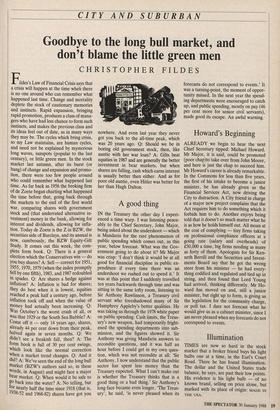CITY AND SUBURBAN
Goodbye to the long bull market, and don't blame the little green men
CHRI STOPHER FILDES
Fildes's Law of Financial Crisis says that a crisis will happen at the time whel there is no one around who can remember what happened last time. Change and mortality deplete the stock of cautionary memories and instincts. Rapid expansion, bringing rapid promotion, produces a class of mana- gers who have had less chance to form such instincts, and makes the previous class and its ideas feel out of date, as in many ways they may be. The cycles which bring crisis, so my Law maintains, are human cycles, and need not be explained by mysterious long waves, sunspots (popular to the last century), or little green men. In the stock market last autumn, after its burst (or bang) of change and expansion and promo- tion, there were too few people around who could remember what happened last time. As far back as 1956 the broking firm of de Zoete began charting what happened the time before that, going back through the markets to the end of the first world war, comparing shares with government stock and (that underrated alternative in- vestment) money in the bank, allowing for interest and dividends, allowing for infla- tion. Today de Zoete is the Z in BZW, the securities side of Barclays, and its annual is now, cumbrously, the BZW Equity-Gilt Study. It comes out this week, the com- plete form book. Q: There is a general election which the Conservatives win — do you buy shares? A: Sell — correct for 1951, 1955, 1970, 1979 (when the index promptly fell by one fifth), 1983, and 1987 redoubled in spades. Q: Are shares a hedge against Inflation? A: Inflation is bad for shares; they do best when it is lowest, equities reached a peak half a century ago, before inflation took off and when the value of money had actually been increasing. 0: Was October's the worst crash of all, or was that 1929 or the South Sea Bubble? A: Come off it — only 14 years ago, shares, already 44 per cent down from their peak, halved again in seven months. Q: We didn't see a freakish fall, then? A: The form book is full of 30 per cent swings, which look like the normal correction When a market trend changes. Q: And it did? A: We've seen the end of the long bull market (BZW's authors said so, in these words, in August) and might face a major bear market. Q: When would it be safe to go back into the water? A: No telling, but for nearly half the time since 1918 (that is, 1938-52 and 1968-82) shares have got you nowhere. And even last year they never got you back to the all-time peak, which was 20 years ago. Q: Should we be in boring old government stock, then, like auntie with her war loan? A: Gilts beat equities in 1987 and are generally the better investment in bear markets, but when shares are falling, cash which earns interest is usually better then either. And as for poor old auntie, even Hitler was better for her than Hugh Dalton.


















































 Previous page
Previous page